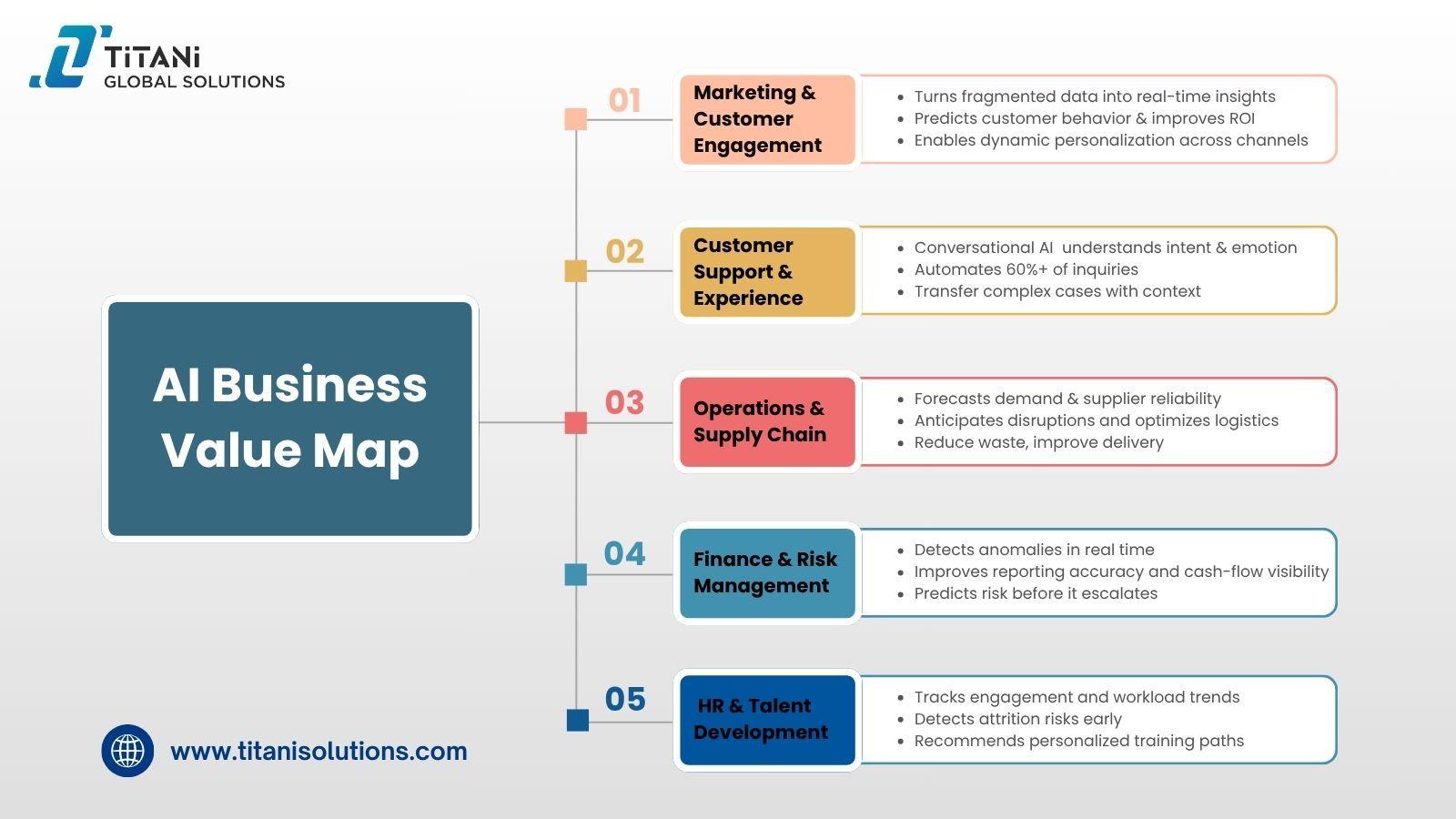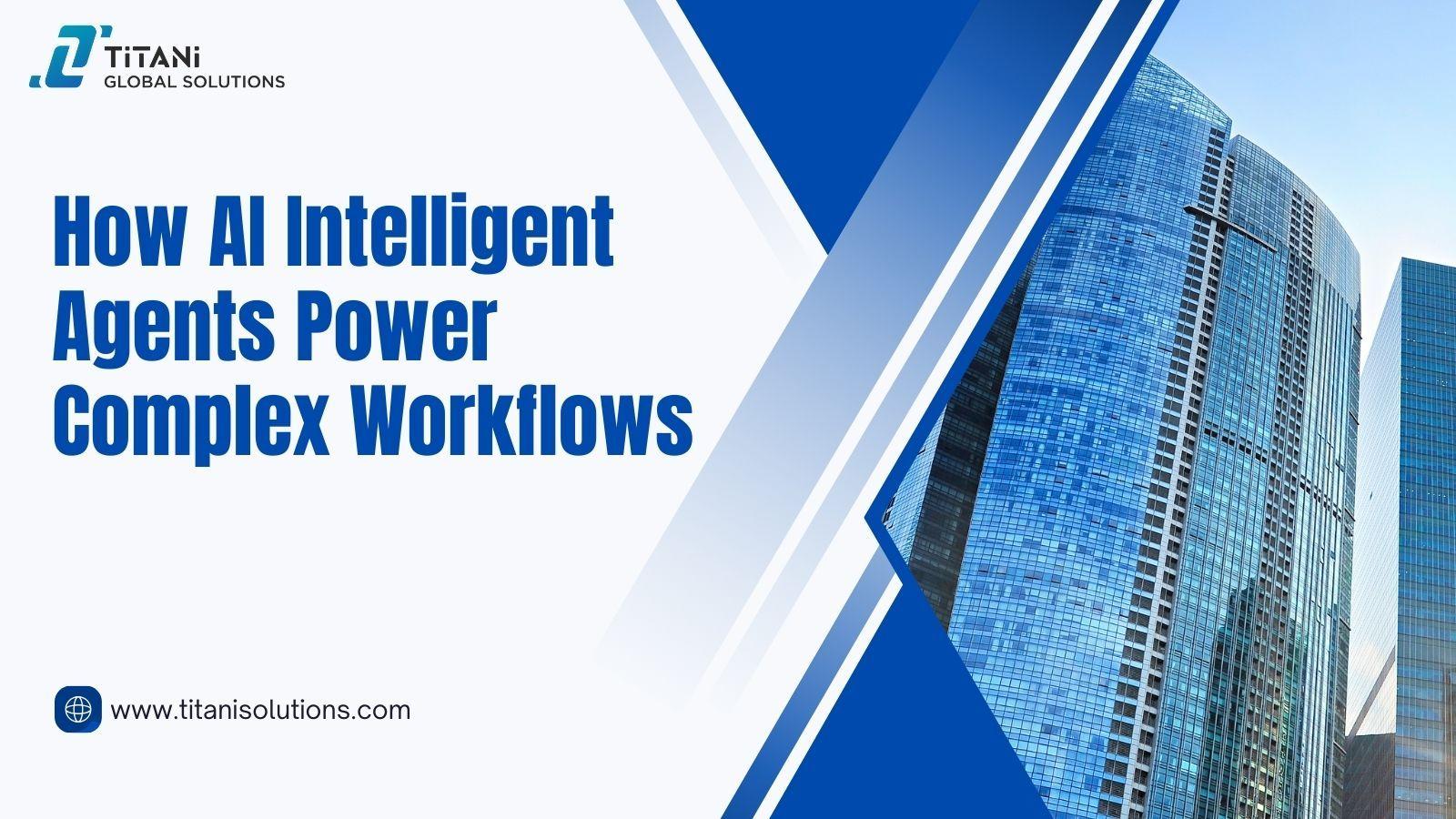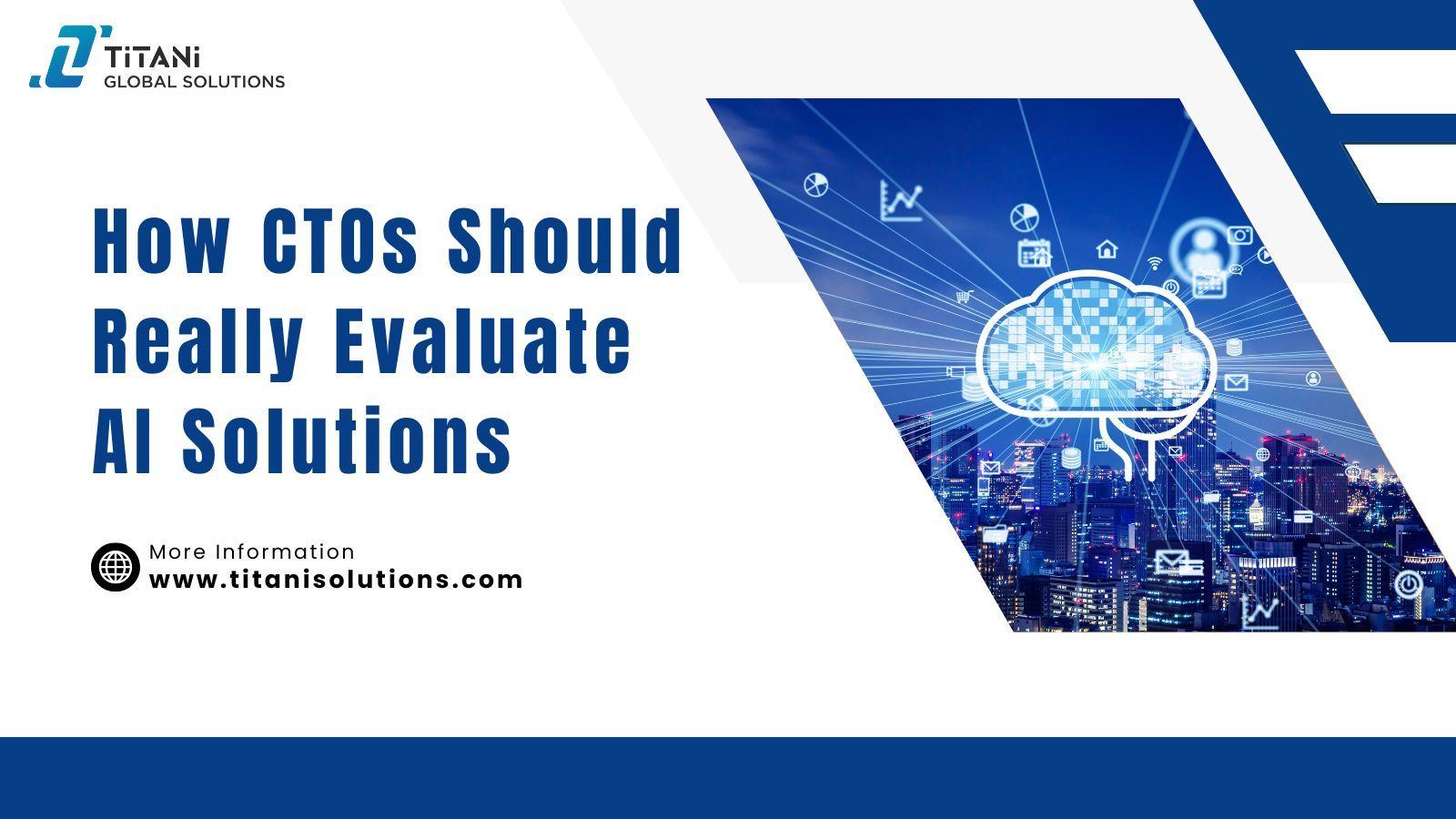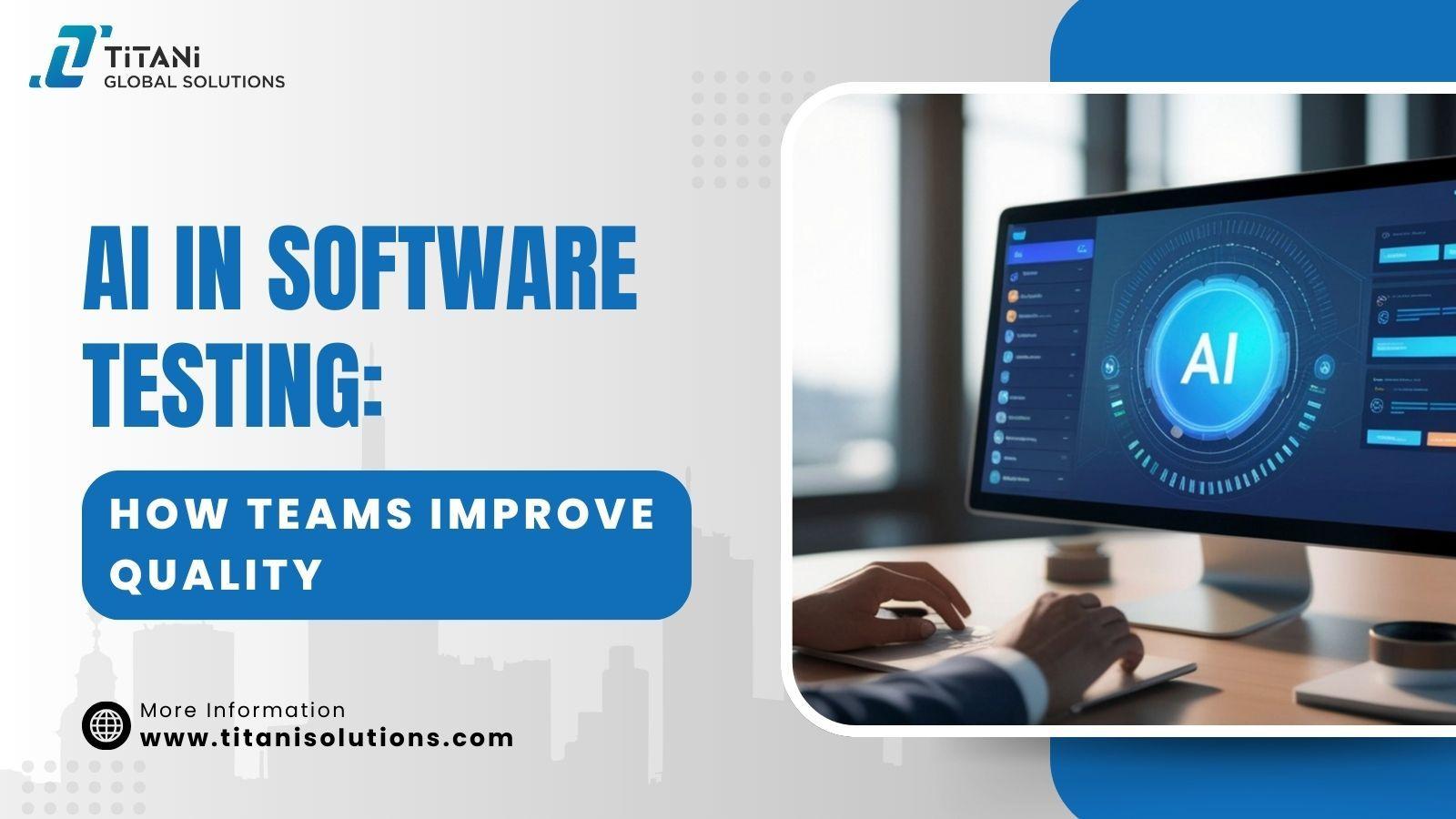Summary
AI adoption is easy — turning it into measurable growth is the real challenge.
Enterprises are shifting from automation to intelligence, where systems learn and adapt in real time.
AI delivers business value across marketing, operations, finance, and HR through predictive, data-driven insights.
The future is Intelligent Collaboration — combining human expertise with Responsible AI for sustainable growth.

You have invested heavily in Artificial Intelligence. Yet, instead of measurable growth, you are left with complicated dashboards and theoretical models that fail in the real world.
The painful truth is this: AI adoption is no longer the hard part. The critical challenge for enterprises today is turning that investment into tangible, measurable business value.
Titani Global Solutions: From technology overwhelm to business impact
Your organization does not need another separate tool. You demand intelligent systems that can learn, adapt, and act, seamlessly connecting data, people, and processes to drive smarter decisions in real time.
At Titani, we transform advanced technology into practical, outcome driven impact. Our mission is clear: enhance customer engagement, accelerate decision making, and deliver clear ROI, all built on a foundation of transparency and security.
Discover how leading businesses are moving beyond simple automation to achieve true competitive advantage.
The Shift: From Automation to Intelligence
What made enterprises efficient yesterday can make them obsolete tomorrow. For years, automation defined digital efficiency — reducing costs, streamlining workflows, and minimizing error.
But as data volumes grow exponentially, traditional systems can no longer keep pace with real-time business demands. According to the McKinsey State of AI 2024 Report, organizations that embed AI into core operations achieve up to 40% higher productivity than those relying on automation alone.
The reason is simple: automation executes, but intelligence understands. Traditional scripts follow instructions; AI interprets intent, adapts to context, and learns continuously from new data. This evolution transforms AI from a mere tool into what Gartner calls an enterprise intelligence layer — a connected framework uniting data, processes, and people to enable smarter, faster decisions.
Forward-thinking enterprises are already embracing this next phase. They predict customer needs before they arise, optimize supply chains dynamically, personalize engagement through intelligent conversations, and empower finance and HR teams with real-time insights.
At Titani Global Solutions, we call this evolution intelligent transformation — not about replacing people but amplifying human capability. By integrating AI responsibly across every layer of the organization, businesses create a self-improving ecosystem that scales insight, accelerates innovation, and delivers measurable ROI — all with transparency and security at the core.
Core Areas Where Artificial Intelligence Delivers Business Value
It’s one thing to hear about the potential of AI but knowing exactly where to aim for maximum measurable value is another.
Let’s be honest: Artificial Intelligence is not a magic switch. It is a strategic framework designed to make your decisions smarter, faster, and more precise.
For most modern enterprises, the question is no longer, "Should we use AI?" but rather: "Where will AI create the highest measurable, high-impact value?"
At Titani Global Solutions, our real-world experience shows that the most successful AI initiatives always start in focused, high-leverage areas—where data directly drives outcomes and efficiency. This is the sweet spot where data availability, decision complexity, and strategic importance converge.
These domains across various industries offer the clearest proof of how AI transforms complexity into quantifiable performance gains.
The five key business areas outlined below represent where artificial intelligence consistently delivers sustainable value and long-term transformation.

1. Marketing and Customer Engagement: From Data Noise to Predictive Relevance
Marketers are drowning in data and frustrated that it isn't translating into meaningful action or revenue. This is where AI delivers its fastest, most visible impact right out of the gate.
AI cuts through the data overload, giving you the clarity to know exactly when a customer will engage, what messages drive conversion, and which channels deliver the highest ROI. Instead of betting on static segments, your team can personalize every touchpoint based on real-time behavior and predictive insight.
Real-World Impact:
A global retail enterprise deployed an AI-driven recommendation engine trained on three years of transaction data. Within three months, it automatically optimized content and offers across web and email. Engagement rose by 32%, repeat purchases increased by 18%, and, crucially, ad spend efficiency improved as budget was reallocated away from low-intent audiences.
Why it matters:
AI transforms Marketing from reactive analysis to proactive precision. It empowers your teams to make decisions guided by customer behavior, not budget assumptions—creating a continuous learning loop that directly enhances ROI and long-term brand relevance.
2. Customer Support and Experience: Turning Conversations into Intelligence
Customer service has moved beyond scripted responses and costly call centers. It has evolved into intelligent, human-like communication. Modern conversational AI systems, like Titani’s Intelligent Virtual Assistant (iVA), understand intent, emotion, and context, allowing your business to resolve inquiries faster and more empathetically.
Real-World Impact:
A leading telecom enterprise integrated conversational AI into its helpdesk. The system autonomously handled 60% of incoming requests, accurately identifying context and providing instant resolutions. Complex cases were transferred seamlessly to human agents with full conversation summaries. Average response time dropped by 70%, customer satisfaction rose by 24%, and human agents were freed up for high-value problem-solving.
Why it matters:
AI elevates customer service from a cost center to a relationship engine. Every interaction becomes a valuable data point that continuously feeds intelligence—improving products, anticipating demand, and strengthening brand loyalty. This is about delivering faster, more personalized experiences that build trust at scale.
3. Operations and Supply Chain: From Efficiency to Resilience
Operational stability is the bedrock of business success. But global volatility means you need more than just efficiency—you need foresight. AI gives your organization the ability to anticipate disruptions and optimize performance across complex, sprawling supply networks.
Real-World Impact:
A manufacturing company integrated an AI forecasting model into its ERP system. The system analyzed supplier reliability, logistics patterns, and seasonal demand data to predict future requirements for over 200 product lines. It automatically adjusted restock schedules and flagged potential shortages weeks in advance. As a result, inventory costs dropped by 22%, lead times shortened, and on-time delivery improved by 15%.
Why it matters:
AI doesn't just make operations faster—it makes them smarter and future-proof. Predictive analytics give your business the agility to plan proactively, reduce waste, and adapt to market shifts before they turn into costly risks. This kind of operational foresight is the new competitive advantage.
4. Finance and Risk Management: Precision, Prediction, and Protection
Financial performance hinges on accuracy and speed—the two areas where AI excels. AI systems continuously monitor transactions, detect subtle anomalies, and forecast cash flow, helping finance teams prevent risk and act early.
Real-World Impact:
A mid-sized bank implemented an AI-based anomaly detection engine trained on three years of transaction history. The system immediately identified subtle irregularities—like unusual payment timing and inconsistent geolocation data—risks traditional systems consistently missed. Within weeks, fraud losses decreased, and audit accuracy improved. Furthermore, financial reporting cycles were reduced by 30%, giving executives real-time, actionable visibility into financial health.
Why it matters:
AI enables finance teams to predict and prevent rather than react and reconcile. It dramatically strengthens governance, improves accuracy, and frees up time for strategic decision-making—allowing CFOs to focus on driving growth, not just compliance headaches.
5. Human Resources and Talent Development: Building Smarter, Fairer Workplaces
Managing people requires both empathy and evidence. AI provides HR leaders with the data-driven visibility needed to make fair, strategic workforce decisions, moving beyond gut feeling.
Real-World Impact:
A logistics company used AI analytics to monitor employee engagement and workload across departments. The system detected early signs of fatigue and accurately identified teams with rising attrition risk. After adjusting workloads and implementing personalized training programs, employee turnover dropped by 20% and overall productivity rose by 12% within a year.
Why it matters
AI helps organizations understand their people as well as they understand their balance sheet. By identifying patterns that humans can't see, HR teams can create healthier, more equitable workplaces where employee growth directly aligns with business performance and talent retention.
Where to Begin: Focus on Impact
Not every enterprise needs to apply AI everywhere. The most successful transformations begin where it matters most—high-volume, data-heavy areas that directly affect customer experience, cost, or growth.
By strategically implementing artificial intelligence in these priority functions, your organization can secure measurable wins, build internal confidence, and establish a foundation for continuous, profitable innovation.
At Titani Global Solutions, we specialize in helping businesses pinpoint these high-impact opportunities and deploy AI responsibly ensuring that your innovation always aligns with tangible, sustainable value creation.
Strategic Benefits of Artificial Intelligence for Enterprises
Adopting artificial intelligence is not just about adding new tools — it is about unlocking a smarter, more adaptive way for businesses to operate, learn, and grow. When implemented strategically, AI becomes a multiplier of human capability, accelerating decision-making, improving resilience, and driving sustainable performance across every function.
According to the McKinsey State of AI 2024 Report, organizations that have embedded AI effectively report productivity gains of up to 40% and stronger financial performance across multiple industries. These outcomes are not driven by technology alone, but by the strategic alignment between AI initiatives and core business objectives.
Across sectors, enterprises that integrate AI successfully see four consistent areas of measurable benefit — Efficiency, Innovation, Decision Velocity, and Cost Optimization. Each represents a step toward transforming AI from a set of tools into a true growth engine.
1. Efficiency: Doing More with Greater Precision
AI enhances productivity by automating repetitive, high-volume tasks while maintaining accuracy and consistency. It reduces manual errors and frees employees to focus on higher-value activities that require human creativity and judgment.
For example, automating document analysis, customer interactions, or data reconciliation allows teams to process thousands of requests in minutes rather than hours.
In one enterprise rollout, a finance department using AI reconciliation tools reduced reporting time by 35 percent and eliminated recurring data-entry errors that had cost thousands annually.
The strategic takeaway: Efficiency is not just about saving time; it is about multiplying the impact of existing resources. In a period of tight labor markets and rising costs, AI enables organizations to grow without proportional increases in headcount or overhead.
2. Innovation: Turning Data into New Value
AI fuels innovation by converting scattered data into a source of discovery. Machine learning models detect market shifts, customer sentiment, and process inefficiencies that often lead to new products, services, or revenue streams.
Predictive analytics helps logistics firms design smarter delivery routes, while AI-assisted R&D platforms accelerate testing cycles for new products. Organizations that integrate these insights into their strategies consistently outperform competitors who rely on manual forecasting.
The bigger impact: Innovation no longer depends only on intuition but on intelligence — systems that reveal opportunities humans may not see. AI turns insight into invention, enabling organizations to innovate continuously and with purpose.
3. Decision Velocity: From Information to Action
Every modern enterprise generates more data than humans can interpret. Artificial intelligence bridges that gap by transforming complex datasets into clear, actionable insights.
Leaders with access to predictive dashboards and AI-driven recommendations can make strategic decisions in hours instead of weeks. Sales teams can respond immediately to market shifts, while operations managers can adjust resources based on real-time performance.
The business outcome: Decision speed is emerging as a defining competitive advantage. AI reduces the delay between observation and action, ensuring that business strategy evolves in sync with real-world change.
4. Cost Optimization: Sustainable Growth Through Intelligent Allocation
Artificial intelligence helps businesses optimize costs without compromising quality or innovation. It identifies inefficiencies across marketing, production, and operations, enabling leaders to redirect budgets to the areas with the greatest strategic impact.
A manufacturing firm using AI-driven predictive maintenance detected early signs of equipment failure and avoided costly downtime. Another enterprise applied AI to streamline claims validation, reducing operational expenses by 25 percent while improving accuracy and customer satisfaction.
The bottom line: AI transforms cost control into continuous optimization. Savings generated through automation and analytics can be reinvested into innovation and growth, turning efficiency into a sustainable competitive edge.
AI Implementation: The Real Scaling Challenges (and How to Conquer Them)
Even when the potential is clear, many AI initiatives stall and fail to scale. Let’s be honest – the true barriers are rarely technical; they are deeply organizational. Addressing these systemic challenges early is crucial for building a sustainable, value-driven AI strategy that delivers lasting ROI.
1. The Vague Vision – Lack of Clear Business Objectives
Many projects are born from enthusiasm but die from ambiguity. When initiatives lack defined Key Performance Indicators (KPIs), they only generate “insights” instead of measurable impact. The imperative is simple – anchor every AI goal to tangible business outcomes, whether boosting customer lifetime value, reducing operational costs, or accelerating strategic decision-making.
2. The Data Bottleneck – Poor Quality and Fragmented Integration
Your AI is only as capable as the data feeding it. Fragmented, inconsistent, or “dirty” data leads to biased insights and unreliable models. The foundational step is to build a unified, resilient data architecture – the bedrock for trustworthy and explainable AI systems.
3. The Accountability Gap – Over-Automation Without Human Oversight
Pursuing efficiency without accountability is a major risk. Over-reliance on black-box automation can obscure how and why critical decisions are made. Embedding human-in-the-loop review and transparency mechanisms ensures responsible outcomes by combining machine precision with human judgment.
4. The Culture Clash – Ignoring Change Management and Upskilling
Technology doesn’t transform organizations – people do. Resistance arises when teams don’t understand how AI affects their roles. Proactive investment in communication, targeted training, and AI literacy turns hesitation into confidence and long-term adoption.
At Titani Global Solutions, we tackle these systemic challenges head-on through our responsible AI framework, which integrates governance, security, transparency, and incremental scaling – translating AI potential into measurable business performance.
The Next Horizon: Intelligent Collaboration
Artificial intelligence is rapidly evolving from an operational tool into a strategic business partner. The next era of transformation will not be defined by how many processes a company automates, but by how intelligently its systems connect, communicate, and learn.
Success depends on expertly blending human expertise with machine intelligence – a future where AI interprets complex intent, anticipates outcomes, and empowers people to make faster, more confident decisions. Every customer interaction, transaction, and data point becomes part of a continuously learning enterprise.
At Titani, we pioneer this era of Intelligent Collaboration – where technology amplifies human potential and transforms overwhelming complexity into actionable clarity.
Ready to Transform Automation into Enterprise Intelligence?
Don’t let your AI investment stagnate – book a strategic consultation with Titani’s AI experts to define your roadmap, accelerate scaling, and ensure your AI delivers measurable business value.



